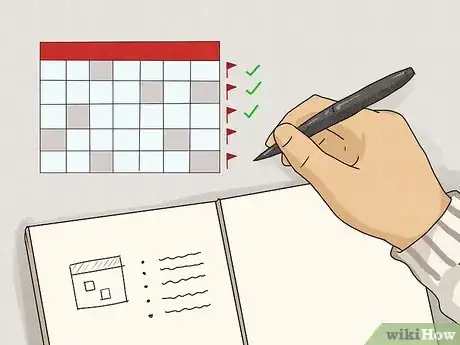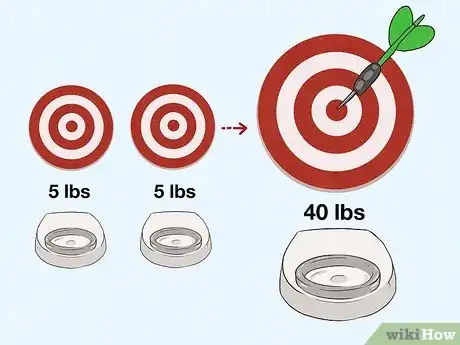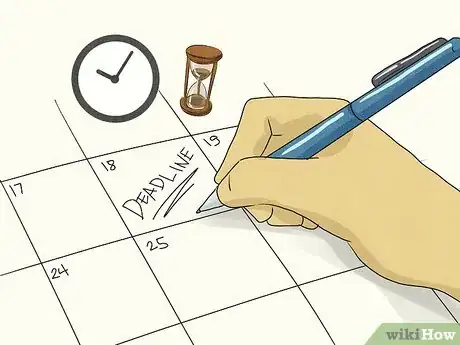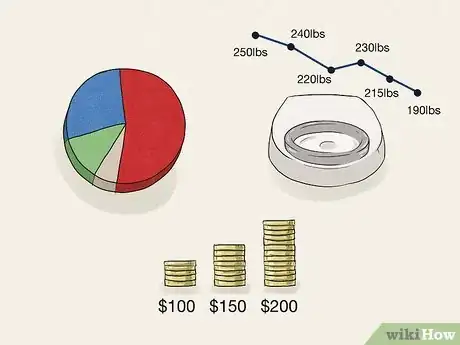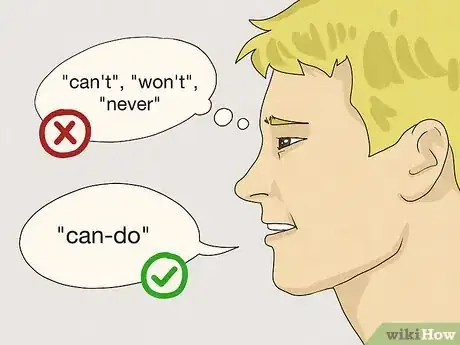This article was co-authored by Klare Heston, LCSW. Klare Heston is a Licensed Independent Clinical Social Worker based in Cleveland, Ohio. With experience in academic counseling and clinical supervision, Klare received her Master of Social Work from the Virginia Commonwealth University in 1983. She also holds a 2-Year Post-Graduate Certificate from the Gestalt Institute of Cleveland, as well as certification in Family Therapy, Supervision, Mediation, and Trauma Recovery and Treatment (EMDR).
There are 15 references cited in this article, which can be found at the bottom of the page.
This article has been viewed 32,152 times.
Do you often feel like you're not giving it your all, like you are just getting by in life? If so, it may be time to become the best version of yourself possible. When you take the steps to become an optimally functioning person, you’ll feel happier and have a better outlook on life. You can become your best self by choosing the right goals, developing a plan, and building healthy habits that help you reach your goals.
Steps
Choosing Goals
-
1Select a goal you can commit to. It’s been said that practicing for 10,000 hours on something will help you perfect a skill. If you can’t put in that kind of effort, you’ll likely fail. Therefore, choose something that you’re willing to put in time and effort to work towards.
- For example, you’ll need a lot of time to train if you want to run a marathon. You can’t expect to run for a week and then have the endurance or physical strength to make it 26.2 miles (42.2 km). You’ll need to give yourself time in order to achieve that goal.[1]
-
2Pick something that brings you satisfaction. You may as well feel good about yourself if you’re going to put in all that time and effort to become an optimally functioning person. Choose to work on something that makes you feel good about yourself.
- Perhaps choose something you’ve always wanted to achieve. You could also work towards helping your community, a talent you’ve wanted to showcase, or just something that helps you become the best version of yourself overall.[2]
Advertisement -
3Choose goals that match your values. Values are the ideas and beliefs that drive your life. This may seem like a no-brainer, but you're more likely to stick to a goal if you actually believe in it. Think about your personal values and then build goals that go in line with them.
- For example, if you value family, you might have difficulty achieving your goal if it always pulls you away from your loved ones. Make sure your goals support your values instead of pushing against them.[3]
-
4Choose something that plays up your strengths. It's nice to set goals that help you improve on your weaknesses, but you're more likely to enjoy and commit to goals that focus on your strengths. Pay attention to the things you're really good at. Build your goals around these strengths.
- For example, you might set a goal to master something you are already good at, such as a certain sport, a specific subject, or a favorite hobby. Working towards becoming better at something you are already good at can make your goals more achievable.[4] However, you might also want to begin a new venture.
-
5Set short-term, immediate goals. Challenge yourself each week to get you closer to your goal. Set time aside each day to work on that task. Write down what you’ve done each day to hold yourself accountable. Long-term goals are necessary, too, but more immediate goals help you build healthy habits and boost self-confidence.
- For instance, you might have a long-term goal of starting a business. A more immediate short-term goal might be to learn bookkeeping or marketing, which will help you achieve the long-term goal.
- Don’t beat yourself up too much if you miss one day. Simply get back to it the next day and try to stay on track as best as possible.[5]
Working on a Plan
-
1Conduct some research. If you are well-informed about your goal, you have a better chance of accomplishing it. So, before you develop an action plan for your goals, spend some time learning what you will have to do to reach them.[6]
- For example, if you set a goal to get accepted into college, you might conduct some research on this goal. From your research, you might learn that you need to keep your GPA high in high school, pass a college entrance exam, and participate in extracurricular activities.
-
2Break the goal down into smaller parts. Once you've done your research, it's time to map out your goal. The best way to do this is by dividing it into smaller parts. This makes your goal more doable, and helps you build energy to keep going.[7]
- For example, if you set a goal to lose 40 pounds, you might set miniature milestones for every 5 pounds lost, or even every 2 pounds lost.
-
3Set a deadline. The most effective goals are time-sensitive, meaning you have a clear deadline. You won't be as motivated to reach your goal if it has an open end date. Set a realistic but challenging deadline for your goal and stick to it.[8]
-
4Find ways to track your progress. How will you know when you cross the finish line for your goal? For some goals, the end point is obvious--for others, not so much. That's why it's important to measure your progress as you move along. How you track your progress will depend on your goal and your personal preferences.[9]
- For instance, if you are trying to save money by a certain date, you can track your progress by using a savings account that tells you your current balance. If you are trying to lose weight, you can track your weight and measurements at intervals (like every week or two) in an app like MyFitnessPal.
- You can also draw out a chart that shows your steady progress towards the goal.
Creating Habits to Accomplish Your Goals
-
1Get some accountability. To be an optimally functioning person, you will want to stay on track with your goals. You have a better chance of doing that if you're not the only one holding yourself accountable. Reach out to a friend or family member who can help you stick with your goals.
- It will be even more fun if the person you reach out to is interested in the same goal. For example, you and a buddy might set personal goals to workout more in the gym together. If someone's counting on you, you're more likely to stick with it.
-
2Take care of difficult tasks first. Delaying is a recipe for disaster. The longer you put something off, the more excuses you’ll have to never get started. Get up each day and get started on your toughest task within an hour of waking.[10]
- If you tackle the hardest task right away, you can go through the remainder of your day knowing that you have been somewhat productive. Plus, once you do the hardest task, you will feel more capable of taking on others.
-
3Get rid of negative language. No one can make you feel as bad about yourself as you can. You know your insecurities better than anyone. That little voice in your head can make you feel low, but you’ll need to silence it if you want to be the best you can be.
- Start by removing certain words from your vocabulary. Eliminating words like “can’t,” “won’t,” “never,” and “always” can help you move towards a more positive "can-do" mindset.[11]
-
4Stop worrying about what others think of you. The fear of criticism from others can stop you from being the best person you can be. Tell yourself it doesn’t matter what others think about you. You are in control of your happiness and if you are happy, that’s what is important.
- Also realize that people probably don’t care as much as you think they do. You may think they are concerned about every detail of your life, when in reality, they are only thinking about themselves.[12]
-
5Envision your success often. Imagine yourself reaching your goal. Envision yourself crossing the finish line, getting your dream job, or building that community center you’ve always wanted to. Remember how you felt when you imagined reaching your goals and refer back to them if you become discouraged.[13]
- Start a daily habit of setting aside a few minutes each morning to visualizing your goals being reached. Try to activate all your senses and make your visions as real as possible.
-
6Support your mental health. Being of sound mind can increase your chances of becoming the optimally functioning person you want to be. Stress can make you start doubting yourself, so take measures to keep stress at bay.[14]
- Support your mental health by practicing mindfulness meditation. Journal to understand your thoughts and feelings. Start a stress-relief toolbox with activities like deep breathing, light reading, or taking a walk outside. Take time each day to do something you enjoy.
-
7Improve your physical health and fitness. Well-adjusted people are physically healthy and fit. This will give you enough energy to cope with daily stress, and other physical demands. Remember, you will also need to be willing to change unhealthy physical behaviors and habits in order to improve.[15]
- Exercise at least 30 minutes on most days of the week with activities like running, swimming, or weight training. Eat a balanced diet of real foods such as whole grains, lean protein, fruits and vegetables, and healthy fats.
-
8Be selective with your relationships. Don't settle for toxic or negative people who make you doubt your abilities. Settle for no less than happy, positive people who value you and what you bring to the table.
- Get your distance from unhealthy relationships in favor of those who support you and help you to grow.[16]
-
9Seek professional help for emotional issues. If self-doubt prevents you from reaching your goals, it may be necessary to reach out for help. A mental health counselor or therapist can help you identify the barriers that are keeping you stuck so that you can stop self-doubt and achieve your goals.[17]
References
- ↑ http://time.com/18659/the-five-paths-to-being-the-best-at-anything/
- ↑ https://blogs.scientificamerican.com/beautiful-minds/how-to-be-an-optimal-human/
- ↑ https://www.mappingyourfuture.org/successincollege/goals.cfm
- ↑ https://blogs.scientificamerican.com/beautiful-minds/how-to-be-an-optimal-human/
- ↑ http://www.success.com/article/your-september-action-plan-10-ways-to-be-the-best-version-of-yourself
- ↑ https://www.mappingyourfuture.org/successincollege/goals.cfm
- ↑ http://lifehacker.com/5925801/how-can-i-turn-vague-goals-into-actionable-to-dos
- ↑ http://blog.connectionsacademy.com/how-students-can-achieve-goals-by-setting-deadlines/
- ↑ https://blog.bufferapp.com/how-to-measure-progress-in-your-personal-goals-daily-weekly-and-monthly
- ↑ https://www.fastcompany.com/1592454/work-smart-do-your-worst-task-first-or-eat-live-frog-every-morning
- ↑ http://www.lifehack.org/articles/communication/starting-today-stop-these-6-things-become-the-best-version-yourself.html
- ↑ https://www.inc.com/chad-perry/science-says-stop-doing-this-to-eliminate-self-doubt.html
- ↑ https://www.forbes.com/sites/forbesleadershipforum/2012/04/23/seven-steps-to-conquering-self-doubt/2/#79482c135768
- ↑ https://www.psychologytoday.com/blog/struck-living/201202/mental-hygiene-preventative-care-mental-illness
- ↑ https://medlineplus.gov/exerciseandphysicalfitness.html
- ↑ https://hbr.org/2016/01/you-cant-achieve-your-goals-without-the-right-support
- ↑ https://psychcentral.com/blog/archives/2014/10/16/7-ways-to-navigate-self-doubt




